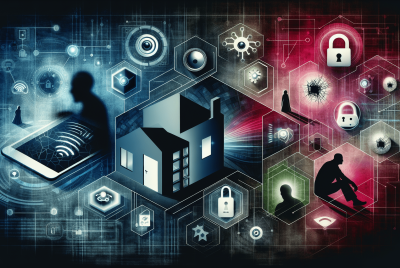What Issues Are There Around Using Smart Devices?
In today’s digital age, it’s hard to imagine life without smart devices. These revolutionary gadgets have become an integral part of our daily routines, effortlessly connecting us to the world at our fingertips. However, with the convenience and endless possibilities they offer, there also come various issues and concerns that need to be addressed. From privacy and security risks to addiction and distraction, the use of smart devices raises significant questions about our relationship with technology and the consequences it may have on our lives.

Privacy Concerns
Data Tracking
Using smart devices often involves giving them access to personal data such as location, browsing history, and online activities. This raises concerns about data tracking and the potential misuse of this information. With data tracking, companies can collect large amounts of information about individuals, including their preferences, behaviors, and even sensitive personal details. This data can then be used for targeted advertising, profiling, or even sold to third parties without the user’s explicit consent.
Data Security
The increasing dependence on smart devices also raises concerns about data security. With sensitive information being transmitted and stored on these devices, there is a risk of data breaches and unauthorized access. Inadequate security measures can leave personal data vulnerable to cybercriminals or hackers who can exploit this information for malicious purposes. As smart devices become more interconnected, the potential for security breaches amplifies, making data security a critical concern for individuals and organizations alike.
Data Sharing
Smart devices often require users to agree to terms and conditions that grant permission for their data to be shared with third parties. This data sharing can occur without users being aware of the extent to which their personal information is being used. The lack of transparency in data sharing practices raises ethical concerns, as individuals may unknowingly contribute to the monetization of their personal information. Additionally, data sharing can lead to the creation of detailed user profiles, which can have far-reaching implications for individual privacy and autonomy.
Cybersecurity Risks
Hacking
As the use of smart devices becomes more widespread, the risk of hacking increases significantly. Cybercriminals can exploit vulnerabilities in device software or network connections to gain unauthorized access to personal data or control over the device itself. Hacking of smart devices can result in identity theft, financial loss, or even the compromise of other connected devices within a network. The rapid advancement of technology makes it challenging for security measures to keep pace, leaving individuals susceptible to malicious attacks.
Malware
Malware, such as viruses, worms, or ransomware, pose a significant cybersecurity risk for smart devices. Once infected, malware can exploit vulnerabilities in device systems or applications, compromising personal data or rendering the device unusable. With the growing number of connected devices, the potential for malware to spread across networks and infect multiple devices is a concerning issue. The consequences can range from data loss to financial extortion, highlighting the need for robust cybersecurity measures to safeguard smart devices and their users.
Phishing
Smart devices provide another avenue for cybercriminals to engage in phishing attacks. Phishing involves tricking individuals into revealing personal information or providing access to sensitive accounts through fraudulent emails, messages, or websites. With the constant connectivity of smart devices, users may unknowingly fall victim to phishing attempts, compromising their personal and financial security. Phishing attacks can result in identity theft, financial loss, or unauthorized access to sensitive information, reinforcing the importance of user awareness and education to mitigate such risks.
Addiction and Dependency
Screen Time Addiction
The increasing prevalence of smart devices has contributed to an alarming rise in screen time addiction. Excessive use of smartphones, tablets, and other devices can lead to a range of negative consequences, including a decrease in productivity, disrupted sleep patterns, and impaired social interactions. The constant access to digital content and online activities can create dependency and interfere with individuals’ ability to disconnect and engage in offline pursuits, impacting their overall well-being.
Social Media Addiction
Smart devices provide instant access to social media platforms, contributing to the rise of social media addiction. The constant need to check notifications, scroll through feeds, and seek validation through online interactions can lead to addictive behaviors. Social media addiction can negatively impact mental health, self-esteem, and interpersonal relationships, as individuals may prioritize their virtual social life at the expense of real-world connections. It is essential to promote healthy habits and digital wellness to address the growing concern of social media addiction.

Health Risks
Blue Light Exposure
Smart devices emit blue light, which can affect sleep patterns and overall eye health. Prolonged exposure to blue light, especially during the evening hours, can disrupt circadian rhythms and melatonin production, making it difficult to fall asleep and achieve restful sleep. Additionally, excessive blue light exposure can lead to eye strain, dryness, and long-term vision problems. Engaging in responsible device usage, such as reducing screen time before bedtime or using blue light filters, can help mitigate these health risks.
Physical Inactivity
The convenience of smart devices often results in sedentary behaviors and reduced physical activity levels. Spending prolonged periods engaged with screens can contribute to a sedentary lifestyle, leading to various health issues, including obesity, cardiovascular disease, and musculoskeletal problems. Encouraging regular breaks, incorporating physical activity into daily routines, and fostering awareness of the importance of movement are crucial to combatting the adverse effects of physical inactivity associated with smart device usage.
Sedentary Lifestyle
Smart devices can inadvertently contribute to a sedentary lifestyle by promoting passive activities such as excessive screen time or prolonged sitting. Sedentary behavior has been linked to an increased risk of numerous health conditions, including diabetes, obesity, and cardiovascular disease. It is important to strike a balance between screen time and physical activity, encouraging regular movement and reducing prolonged periods of sedentary behavior for optimal overall health.
Distracted Driving
Texting while Driving
One of the most significant dangers associated with smart devices is the temptation to use them while driving. Texting or using smart devices behind the wheel diverts attention from the road, increasing the risk of accidents and injuries. Distracted driving can have severe consequences, not only for the driver but also for other road users. It is crucial to prioritize safety and avoid using smart devices while driving, instead opting for hands-free options or completely focusing on the task at hand.
Using GPS while Driving
While GPS navigation systems can be incredibly useful, they can also pose a distraction hazard when used while driving. Constantly glancing at a GPS device or smartphone can divert the driver’s attention from the road, potentially leading to accidents. Prior planning, familiarizing oneself with the route beforehand, and using voice-guided GPS systems can help minimize distractions and ensure safe driving practices.
Social Isolation
Decreased Face-to-Face Communication
The widespread use of smart devices has led to a decrease in face-to-face communication and increased reliance on digital interactions. While smart devices provide convenience and ease of communication, they can contribute to social isolation and a lack of meaningful interpersonal connections. Diminished face-to-face communication can hinder the development of essential social skills and lead to feelings of loneliness and disconnection. It is crucial to foster a healthy balance between digital and in-person interactions to mitigate the potential negative effects on social well-being.
Online Socialization
While smart devices enable individuals to connect with others online, this form of socialization can have its downsides. Relying heavily on online interactions can lead to a shallow sense of community and a lack of genuine connections. Additionally, the perception of curated online lives can contribute to feelings of inadequacy, social comparison, and low self-esteem. Striking a balance between online and offline socialization is essential for maintaining a healthy social life and overall well-being.
Decline in Mental Health
Increased Stress and Anxiety
The constant connectivity and information overload facilitated by smart devices can contribute to increased stress and anxiety levels. The pressure to be always available, the fear of missing out, and the exposure to negative online content can negatively impact mental health. Establishing boundaries, implementing digital detoxes, and cultivating mindfulness practices can help mitigate the negative effects of smart device usage on stress and anxiety levels.
Depression
Excessive smart device usage has also been associated with an increased risk of depression. Social media platforms, in particular, can perpetuate unrealistic standards, foster social comparison, and contribute to feelings of isolation and inadequacy. The curated nature of online content and the addictive nature of these platforms can exacerbate depressive symptoms. Striving for a healthy balance and utilizing smart devices as tools for meaningful connections and positive content consumption can play a crucial role in supporting mental health.
Sleep Disturbances
The blue light emitted by smart devices, coupled with the constant access to digital stimuli, can disrupt sleep patterns and contribute to sleep disturbances. The overstimulation before bedtime, such as late-night scrolling or engagement with stimulating content, can make it challenging to wind down and achieve restful sleep. Establishing consistent sleep routines, implementing screen-free periods before bed, and creating a conducive sleep environment are key to addressing the sleep disturbances associated with smart device usage.
Electromagnetic Radiation
The potential health effects of prolonged exposure to electromagnetic radiation emitted by smart devices have raised concerns. While scientific evidence remains inconclusive, some studies suggest a possible link between extensive use of smart devices and adverse health outcomes, such as certain types of cancers or reproductive issues. The long-term effects of electromagnetic radiation require further research and monitoring, reinforcing the importance of responsible device usage and the implementation of safety guidelines.
Environmental Impact
E-waste
The rapid proliferation of smart devices contributes to the production of electronic waste, or e-waste. As devices become obsolete or damaged, they are often discarded, resulting in environmental consequences. Improper disposal of e-waste can lead to the release of hazardous substances, such as lead, mercury, or brominated flame retardants, into the environment, posing risks to human health and ecosystems. Promoting responsible e-waste management, including recycling programs and sustainable manufacturing practices, is crucial to minimize the environmental impact of smart devices.
Energy Consumption
Smart devices require energy to function, and their increasing prevalence contributes to higher energy consumption. The manufacture, distribution, and use of smart devices contribute to greenhouse gas emissions and the depletion of natural resources. Adopting energy-efficient practices, utilizing renewable energy sources, and encouraging sustainable manufacturing processes are essential steps toward reducing the energy consumption and environmental footprint associated with smart devices.
Ethical Concerns
Manufacturing and Labor Conditions
Smart devices’ production involves complex global supply chains, often with ethical concerns surrounding manufacturing and labor conditions. From the extraction of raw materials to the assembly processes, there are instances of exploitative labor practices, unfair wages, and hazardous working conditions. It is crucial for consumers to be aware of these ethical concerns and support companies that prioritize sustainable and ethical manufacturing practices to ensure fair treatment of workers throughout the supply chain.
Resource Extraction
The production of smart devices relies heavily on the extraction of various resources, including rare earth minerals. Resource extraction can lead to environmental degradation, ecosystem disruption, and the exploitation of natural resources in vulnerable regions of the world. Responsible sourcing practices, including recycling initiatives, ensuring transparency in the supply chain, and promoting sustainable mining practices, are necessary to address the ethical concerns associated with resource extraction for smart devices.




